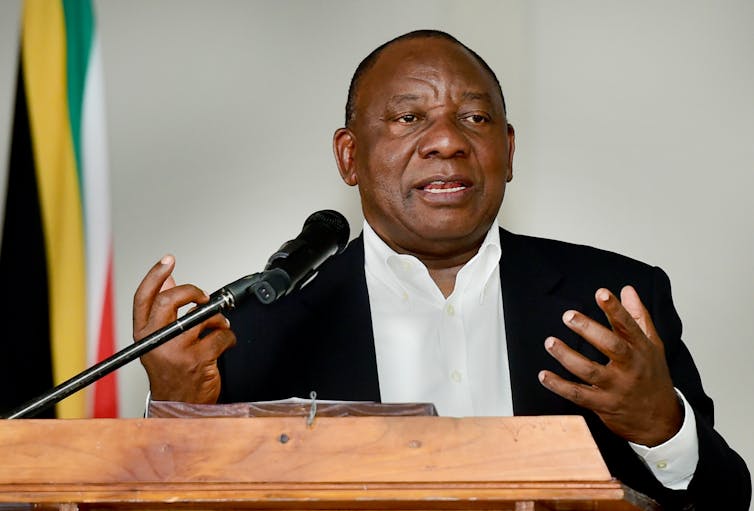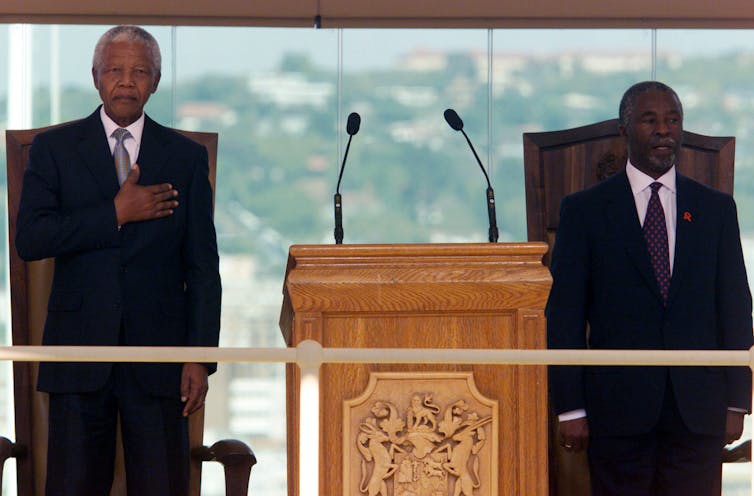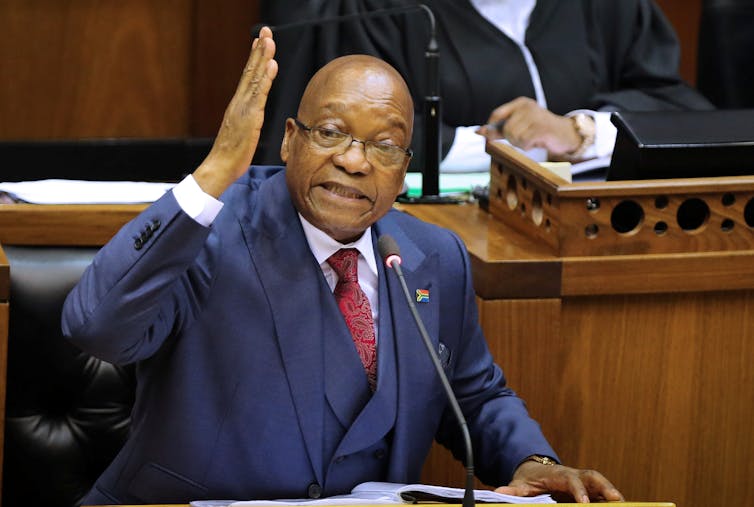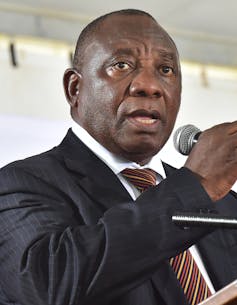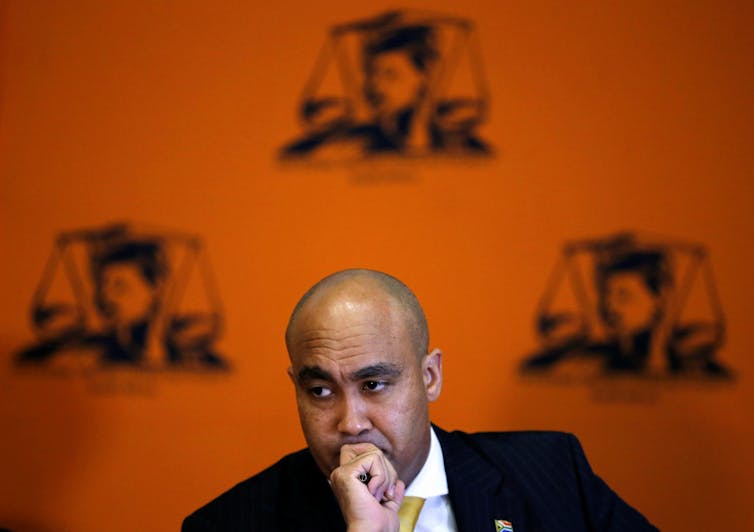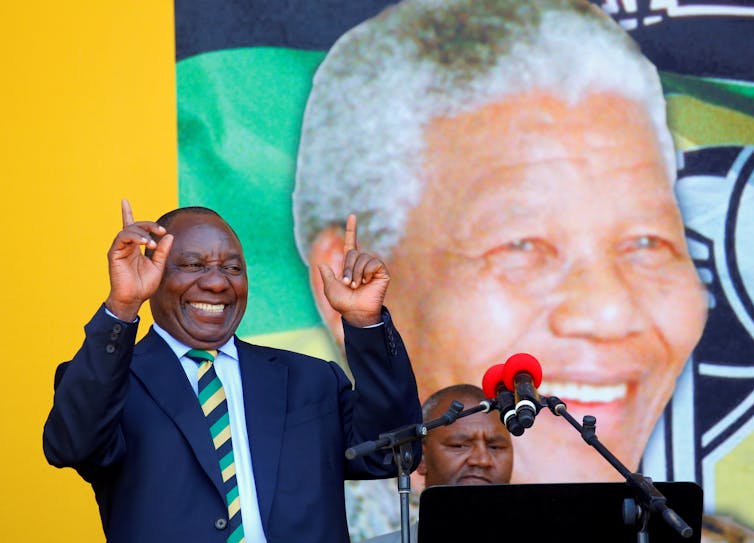
Cyril Ramaphosa addresses a rally to commemorate Nelson Mandela’s centenary year in Cape Town, South Africa.
Reuters/Mike Hutchings
Matamela Cyril Ramaphosa – forgive me, President Ramaphosa – is self-evidently a private and reserved human being. Since his decision to contest the leadership of the African National Congress (ANC), he has been the subject of an endless series of “think-pieces”, more or less informed including by this author, as well as a year or more of attack videos and smears from those he ultimately defeated at the 2017 ANC elective conference. His private life has been examined, and people have tried to double-guess every move he has made, or should have made, or is about to make.
The man must be squirming. Worse than the attention, however, is his recent elevation to Messiah status in the media and the popular imagination. He maketh Zuma to bugger off. He maketh the currency to rise and pessimism to fall; he will cleanse where others defiled; and he may lead South Africans towards the promised land – or, for the non-believers, will it be down the garden path?
Messiahs are an expression of the need for the yoke of oppression to be lifted, by a god-anointed action man (there are precious few female Messiahs in history) who does what mere mortals cannot. Nelson Mandela was South Africa’s first Messiah, but was seemingly born for the role, relished it, and given the massive damage to economy and society in late apartheid, almost everything he did was inevitably positive. The economy grew, rainbows were believed in, the national football team Bafana Bafana were football champions. Anything was possible.
In Ramaphosa’s case, the context is horribly similar. The economy has been smashed by the labyrinthine tendrils of corruption and state capture that have insinuated themselves into every aspect of public life, compounding those already present in the private sector.
For every state owned enterprise there is a private sector player like KPMG, and for every bribe that is accepted, someone else offered it. Zuma tended his corrupt garden well, and South Africa feels like it is the early 1990s again: political killings are rife in KwaZulu-Natal, the economy is in tatters, racial tensions are high, the poor are getting poorer, the rich richer, and the country’s sports people seem unable to win a game of tiddly-winks.
What kind of president?
What kind of president will Ramaphosa be? Will he, like Zuma’s predecessor Thabo Mbeki, gravitate towards foreign affairs, the African continent, and playing a global role in various summits and multilateral bodies? Or will he be more Zuma-like, and regard the secret and security forces as his natural base?
The last 10 days should have answered part of this question. Because of Ramaphosa’s chess moves the country has seen the true colours of everyone in the ANC’s top six leadership and beyond. He and all South Africans now know where many of his enemies are. Those desperate to be reborn Ramaphosa-ites have become visible, and he knows (as South Africans do) who can be trusted and who not. He has forced people to play their roles out in public, for all to see and learn, and better to understand the challenges he faces.
More importantly, the state utility Eskom has been completely reconfigured with a new board, and fear has begun to percolate through to all those eating South Africa’s public funds.
But the most significant moves were left to the very end. Zuma’s last day as president – not in any way coincidentally – began with the news that the home of the powerful Gupta family had been raided and arrests had been made.
The second masterstroke was to allow Zuma to show his true colours in a rambling interview on state television to the nation. Everyone was given a taste of what Ramaphosa has had to deal with.
Once Zuma knew that his time was up – his Gupta buddies being arrested, his son Duduzane being looked for and some of his lieutenants deserting him – he declined into self-pity.
Zuma myths
For years the world has been fed several myths about Zuma. That he was steeped in strategy and that he was a master tactician. There was also the fable that he had dirt on everyone and would never be outmanoeuvred, that even a wounded lion is dangerous, that he may be down but never out, and so on.
Instead, the terrible sadness of a crumpled bully was in evidence on SABC TV. He spent 30 minutes spinning silly yarns about the lack of accusations or evidence against him, insisting he was innocent, trying to blame anyone but himself. It laid bare the truth – Zuma is merely PW (Botha) rebooted. Apartheid president Botha, nicknamed the Groot Krokodil (big crocodile), was a hardliner who refused to leave office and alienated everyone even in his own National Party.
Zuma’s incoherent television appearance was an old jackal meeting an old krokodil. Each filled with a sense of victimhood, denying any wrongdoing, both responsible for destroying the economy, the social fabric, and any number of lives. Ramaphosa left Zuma to show all South Africans his overweening vanity, his inability to distinguish right from wrong, and his arrogance. Shakespeare could not have plotted it better. Ramaphosa emerged as the true strategist.
A mere mortal
Ramaphosa is no Messiah, and when the post-Zuma champagne corks stop popping, South Africans need to assess him as a mere mortal. One who is inheriting a country laid almost as bare as the country Mandela inherited in 1994.
Ramaphosa has a massive job ahead of him, in trying to reignite national pride, self-belief, and mutual trust. He also has to salvage the ANC’s reputation and win the next election in 2019, no mean feat in itself. It would also be nice to win a match or two.
David Everatt, Head of Wits School of Governance, University of the Witwatersrand
This article was originally published on The Conversation.
